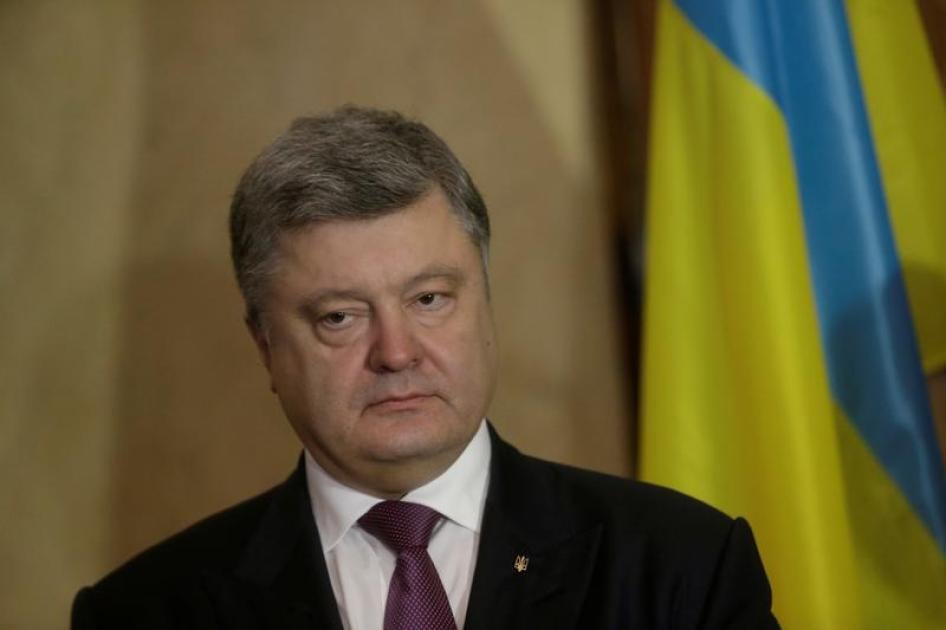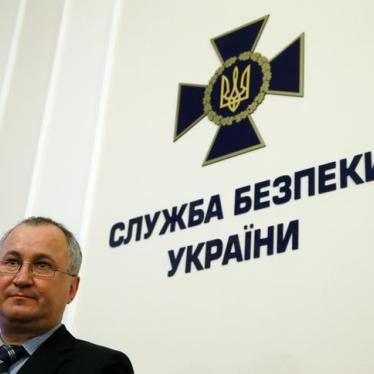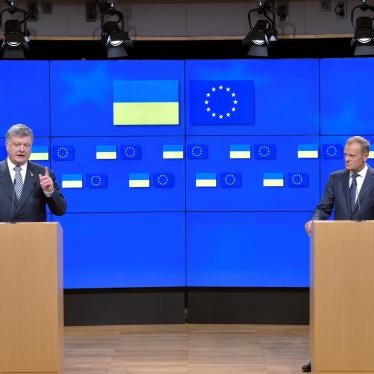(Kyiv) – The Ukrainian government should drop draft legislation to require nongovernmental groups in Ukraine to file detailed public online reports about their funding and employees, Human Rights Watch said today. The Presidential Administration introduced the two draft laws, 6674 and 6675, on July 10, 2017 “to ensure public transparency of the financing of the public associations and the use of international technical assistance.”
If adopted, the draft NGO laws would amend Ukraine’s tax law and other legislation to require nongovernmental organizations with annual budgets above US$18,500 to report publicly online about their funding and staff. Consultants and companies that provide services for these groups, such as freelance work, cleaning services, or catering for events, would also need to publicly report funds they received and their sources. The groups and the tax agency would be required to publish the reports on their websites. Ukrainian law already obliges nongovernmental organizations to submit numerous other reports to the state tax authorities and other government agencies.
President Petro Poroshenko is scheduled to discuss draft laws 6674 and 6675 on September 7 with the Civil Society Coordinating Council, a state body that guides relations between the government and Ukraine’s civil society.
“The requirements in these draft NGO laws are excessive and invasive,” said Tanya Cooper, Ukraine researcher at Human Rights Watch. “Transparency is paramount to any group’s work to gain public trust and ensure accountability, but these draft laws are not the way to achieve it.”
The draft laws include a proposal to lift problematic requirements imposed by the March 2017 amendments to the anti-corruption law on individual employees of nongovernmental groups and activists who carry out anti-corruption work to file annual e-declarations of their private assets and property; under these March 2017 provisions, those failing to file asset declarations face criminal charges and up to two years in prison. But the new draft laws also add the extensive additional reporting requirements that would hamper the work of all independent groups.
Ukraine’s international partners should urge the government to withdraw the draft laws and to submit any draft legislation affecting operations and financing of nongovernmental organizations to the Council of Europe’s Venice Commission or the Organization for Security and Cooperation in Europe’s Office of Democratic Institutions and Human Rights.
Draft laws 6674 and 6675 require nongovernmental organizations to publish on their websites such information as a list of donors that contribute more than US$3,000 annually; the names of the 10 staff members with the largest salaries; the total amount of money the organization pays consultants; and the names of consultants who receive more than US$3,000 annually. The proposals also require consultants who are funded with foreign government assistance to do work for nongovernmental organizations, to publish the names of donors funding their work, and the amount they receive.
The potential consequences of these proposals, if adopted, could significantly jeopardize the work of Ukraine’s independent groups, Human Rights Watch said. They would be forced to expose private information about individuals working and cooperating with them, especially those receiving payments from foreign government assistance. Such a requirement would endanger the security of staff and consultants, particularly those working with human rights and humanitarian organizations in Crimea and regions of eastern Ukraine controlled by Russia-backed armed groups.
The penalty for non-compliance would be the loss of a nongovernmental organization’s non-profit status, which would make them unable to pay their employees and would mean effectively halting the group’s work. Among those who would bear the consequences of this are the people who receive legal, psychological, and humanitarian services that many nongovernmental organizations provide.
“If adopted, this legislation would have a stifling, intimidating impact on Ukrainian NGOs,” Cooper said. “These measures go far beyond what is required of private companies and are punitive, rather than a sincere attempt to rectify alleged problems with NGO accountability.”
In its expert analysis of the draft laws 6674 and 6675, the International Center for Non-for Profit Law (ICNL), which promotes a supportive legal environment for nongovernmental organizations around the world, noted that “none of the European countries impose such burdensome reporting requirements on all public organizations (or associations), as those defined by the Ukrainian draft laws.”
“Dropping the flawed requirements for anti-corruption activists, who are not public officials and should not be subjected to the same scrutiny of their personal assets, is the right thing to do,” Cooper said. “But this should not lead to imposing invasive public reporting on all independent groups, most of which serve the public interest but do not operate on taxpayers’ money.”
Human Rights Watch, Amnesty International, and Freedom House met with the Presidential Administration on August 29 to discuss their concerns with draft laws 6674 and 6675 and to urge withdrawal of the proposals. The organizations urged the government to introduce changes to the anti-corruption legislation as a stand-alone item to lift the filing requirement for anti-corruption activists.
As a member of the Council of Europe and a party to the European Convention on Human Rights, Ukraine has binding and clear obligations to respect freedom of association. The requirements proposed by the Presidential Administration contravene the guidelines set out by the Council of Europe’s Committee of Ministers on NGOs [CM/Rec(2007)14], which state that “[a]ll reporting should be subject to a duty to respect the rights of donors, beneficiaries and staff, as well as the right to protect legitimate business confidentiality.”
“Ukraine’s international partners need to understand the destructive impact these proposals will have on Ukrainian nongovernmental groups,” Cooper said. “They should send a clear message to the Ukrainian government that it should act urgently to exempt anti-corruption activists from unnecessary public reporting without imposing harmful requirements on civil society as a whole.”









